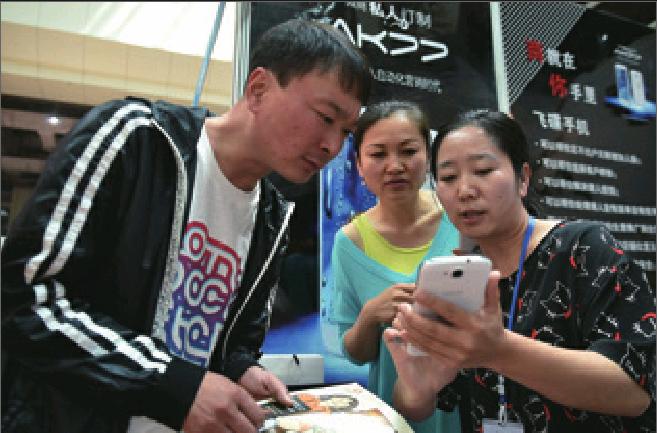No Easy Business
2016-01-15ByYuanYuan
By+Yuan+Yuan

‘If you were to block some of the con- tacts on [the social networking app] WeChat, who would be the first to be blocked?” That question was asked in a recent survey conducted by China Youth Daily. More than half of the 2,006 respondents said that they chose who were trying to sell facial masks.
“Almost all my friends complain that they have some contacts trying to sell stuff and more than 80 percent of them are selling facial masks,” Cai Yijun, a Beijing-based photographer, told Beijing Review. “If someone started to sell facial masks, I would definitely block them.”
“First it was friends living abroad selling cosmetics from the country they live in,” Cai said. “But suddenly facial mask sellers appeared selling brands Ive never heard of.”
This annoyance affected many WeChat users in 2015, regarded as a booming year of businesses on the multi-functional platform.
A popular format
WeChat currently has more than 600 million users in China who rely on it to share photographs and news with friends; send text, audio and video messages; transfer money and even pay for purchases at supermarkets and other shops after combining their bank card details with their WeChat ID.
With more users accessing WeChat, it has unavoidably become more commercialized.
“WeChat has advantages that retail websites dont have,” said Chen Jing, a clothing dealer on Chinas largest online retail marketplace Taobao. com who also runs a WeChat business.
Chen said that WeChat can instantly inform customers about the arrival of new products faster and exclusive promotions.
“Before my WeChat shop was launched, I could only update product information once a week on Taobao and had to announce the exact time they would appear on the webpage one week in advance,” Chen said. “It is more convenient with WeChat. I can do business any time I have new products arriving.”
Wu Zhuyu, a Beijing lawyer and online shopping fan, said that almost all the vendors she visits on Taobao have opened up their business to WeChat.
“They already had followers on Taobao, so running WeChat shops is just a new way to expand their business, and trust is not an issue,”Wu said.
But Wu has concerns about buying on WeChat. Taobao offers dissatisfied buyers refunds. On WeChat, only the sellers can offer refunds. On Taobao, once a transaction is completed, the sellers have to wait for payment because it goes through Alipay, an escrow payment service. On WeChat, the money goes directly to the sellers.
“A reliable third-party online payment platform is necessary for WeChat,” said Shu Jing, who has been running his honey business on WeChat since 2014. “It is hard to expand business right now as the friend circle market is quite limited. Without a reliable payment channel, it is hard to attract more customers.”
Shus parents are beekeepers. Seeing the demand among his friends for good-quality honey, he started to promote his homemade product to contacts on WeChat and the feedback was positive. Encouraged by this response, Shu tried to expand his business but has struggled.
To succeed, Shu said that he needs to create a brand and do marketing, all of which takes time and money. “The positive aspect of doing business on WeChat is that it is almost threshold-free,” Shu said. “But it also limits the scale of operations. When the business giants come in, we cannot compete with them.”
Winter coming
On April 10, China Central Television (CCTV) featured a young woman surnamed Wen who suffered an allergic reaction after using a facial mask she bought on WeChat. Her face became covered in spots. A subsequent investigation by CCTV then found that many of the facial masks available on WeChat came from illegal workshops using low-end ingredients. Some of the masks tested had 6,000 times the level of steroid hormone permitted by law.
The report highlighted the slack supervision of the facial mask business conducted on WeChat.
Choiskycn is a facial mask brand launched in 2013. It appeared to be aimed specifically at WeChat businesses. In 2014, Choiskycn managed to generate sales of 1 billion yuan ($154 million) thanks to about 3 million individuals selling its products on WeChat, according to company sources.
The explosion in the number of sellers has led to suspicions that the brand adopts pyramidselling techniques because of the various levels of sales agents.
“The sellers goal is to develop more agents at the lower level rather than sell facial masks to individual buyers, typical of pyramid selling,” said a seller named Xiaoqiong, a pseudonym.
Xiaoqiong illustrated the selling technique with an example. If the cost of a pack of masks is 10 yuan ($1.54), the general agent can buy it for 20 yuan ($3.08) and sell it to an agent at the next level below for 30 yuan ($4.62). The transactions continue to the lowest level agent who can pay up to 90 yuan ($13.86) for the product. The market price is 100 yuan ($15.4), so even agents at the lowest level can make 10 yuan out of one pack.
Xiaoqiong was attracted by this easy moneymaking venture. As a housewife in Beijing, she wanted a diversion from the tedium of housework and the opportunity to earn some money. A friend who was part of the business encouraged Xiaoqiong to join the team. She soon found herself part of a WeChat group with more than 100 sellers.
“It was just a small part of the entire selling team, and the agent at the upper level guided us every day on compiling the content of the posts that we had to share daily with our circle of friends,” Xiaoqiong said, adding that a condition of becoming a new agent is having to buy 100 packs of the masks from the upper-level agent.
The posts of new agents include pictures of beautiful women holding the facial masks and positive comments made by users. Often these comments are made up, according to Xiaoqiong.
“The funny part was using Photoshop to fake pictures in which we drive a BMW or Mercedes-Benz, or are pictured staying in fivestar hotels,” said Xiaoqiong. “These pictures were designed to attract potential agents and to show how we were making a fortune from selling the masks.”
At first, some of Xiaoqiongs WeChat contacts would ask her about the facial masks after reading her posts, but few of them actually bought the product. After two months, Xiaoqiong discovered that most of her WeChat friends had blocked her.
“I earned no more than 500 yuan ($77) out of selling the facial masks, but I spent about 10,000 yuan ($1,540) on buying packs from the upper-level agent,” said Xiaoqiong.
She cut her losses and gave up the business.
“These facial mask brands devote all their time to recruiting as many agents as possible rather than focusing on the quality of their products,” said Yu Wen, a cosmetic expert, in an interview with China Business Journal. “That is the reason why so many people are selling facial masks on WeChat.”
“It is more like a friends business and all the trade is based on trusting the sellers,” Xiaoqiong said. “Its unreliable.”
Taobao is believed by most shoppers to be more reliable than WeChat because the platform is supervised. However, this supervision doesnt prevent some fake products from appearing.
Wang Yi, CEO of Wecet, a third-party WeChat business platform, told National Business Daily,“WeChat businesses are declining. A business that relies on friend circles is a dead end. Many WeChat business operators are stepping out of the market and the rest are finding themselves at a turning point.”
On November 16, the State Administration for Industry and Commerce announced at a news conference that it was taking action on fraudulent advertising on WeChat. “People can report such advertisements to market regulatory departments,” said Zhang Guohua, an official from the administration. “We will carry out investigations and punish the people posting such advertisements.”
